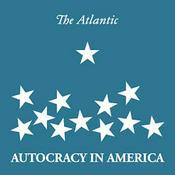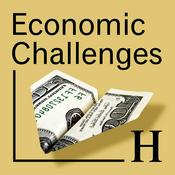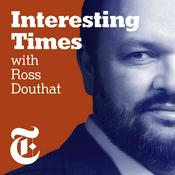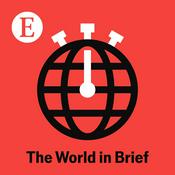15 Episoden
- AI is changing how we work. It's turning us all into managers. Be a good one.
The Economist’s management columnist, Andrew Palmer, takes on the bots in the third season of Boss Class. From cloning to coding, agents to entry-level jobs, he tackles the threat head on and figures out how to turn anxiety into opportunity. Along the way he meets bulls and bears and the people who can help you to master management in the age of AI.
Full Season 3 out 29th January 2026.
To listen, subscribe to Economist Podcasts+.
If you’re already a subscriber to The Economist, you have full access to all our shows as part of your subscription. For more information about how to access Economist Podcasts+, please visit our FAQs page or watch our video explaining how to link your account.
Hosted on Acast. See acast.com/privacy for more information. - Gain a deeper understanding of China with Jeremy Page and Sarah Wu. The Economist’s China correspondents report from across the country and the places it influences beyond its borders. Jiehao Chen joins the discussion from London. This award-winning podcast takes on everything from the CCP to EVs and from ageing to AI. Published every Tuesday.
Hosted on Acast. See acast.com/privacy for more information. - Good bosses are rare. They don’t have to be. The skills of management can be learned.
The Economist’s management columnist, Andrew Palmer, is here to help. The second season of Boss Class features leaders at some of the world’s best performing companies, from Levi’s to Novo Nordisk to Google.
New episodes are out weekly starting May 12th.
To listen to the full series, subscribe to Economist Podcasts+.
https://subscribenow.economist.com/podcasts-plus
If you’re already a subscriber to The Economist, you have full access to all our shows as part of your subscription. For more information about how to access Economist Podcasts+, please visit our FAQs page or watch our video explaining how to link your account.
Hosted on Acast. See acast.com/privacy for more information. - A sophisticated, predatory, multi-billion dollar industry is emerging from the shadows. It already rivals the size of the illicit drug trade. And it’s about to get bigger and much more powerful.
The Economist’s Sue-Lin Wong follows a trail that starts with the collapse of a bank in rural Kansas to uncover a global, underground scam economy built around human trafficking, corruption and money laundering. Can it be stopped?
Available now.
To listen to the full series subscribe to Economist Podcasts+.
Hosted on Acast. See acast.com/privacy for more information. - Necoclí is a tiny town on Colombia’s Caribbean coast. Beach bars blast party music and sell brightly-coloured cocktails. But Necoclí is not just a tourist destination. It is also a stopping point for migrants heading to the United States.
The fastest-growing group among them are Chinese. They are on a journey they call zouxian, or walking the line. Disillusioned with the Chinese dream, they have decided to chase the American version. But first they face a journey that is fraught with peril.
Necoclí is the place migrants stock up on supplies and cash, before putting their trust in smugglers who will guide them across the Darién Gap, a treacherous stretch of jungle separating Colombia and Panama.
In the first episode of this four-part series, Alice Su, The Economist’s senior China correspondent, travels to Necoclí to meet Chinese migrants on their zouxian journey, and asks what drove them to leave China and take such risks.
Transcripts of our podcasts are available via economist.com/podcasts.
Listen to what matters most, from global politics and business to science and technology—subscribe to Economist Podcasts+.
For more information about how to access Economist Podcasts+, please visit our FAQs page or watch our video explaining how to link your account.
Hosted on Acast. See acast.com/privacy for more information.
Weitere Nachrichten Podcasts
Trending Nachrichten Podcasts
Über Drum Tower from The Economist
Gain a deeper understanding of China with Jeremy Page and Sarah Wu. The Economist’s China correspondents report from across the country and the places it influences beyond its borders. Jiehao Chen joins the discussion from London. This award-winning podcast takes on everything from the CCP to EVs and from ageing to AI. Published every Tuesday.If you’re already a subscriber to The Economist, you’ll have full access to all our shows as part of your subscription.For more information about Economist Podcasts+, including how to get access, please visit our FAQs page here https://myaccount.economist.com/s/article/What-is-Economist-Podcasts.
Hosted on Acast. See acast.com/privacy for more information.
Podcast-WebsiteHöre Drum Tower from The Economist, Fellner! LIVE und viele andere Podcasts aus aller Welt mit der radio.at-App

Hol dir die kostenlose radio.at App
- Sender und Podcasts favorisieren
- Streamen via Wifi oder Bluetooth
- Unterstützt Carplay & Android Auto
- viele weitere App Funktionen
Hol dir die kostenlose radio.at App
- Sender und Podcasts favorisieren
- Streamen via Wifi oder Bluetooth
- Unterstützt Carplay & Android Auto
- viele weitere App Funktionen


Drum Tower from The Economist
Code scannen,
App laden,
loshören.
App laden,
loshören.









































